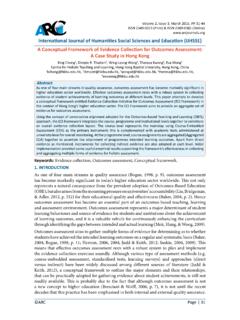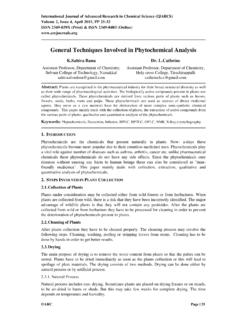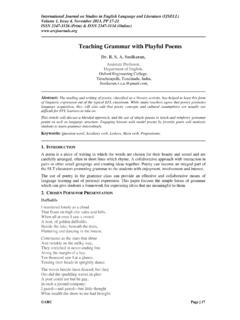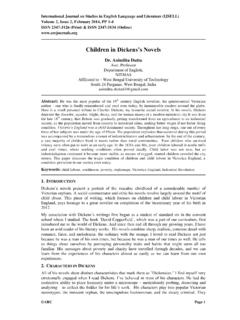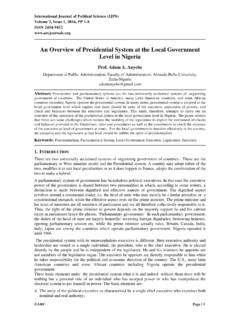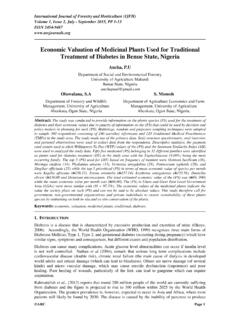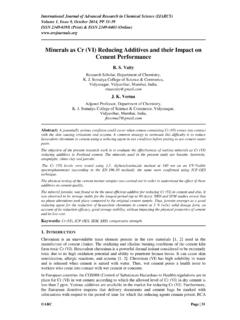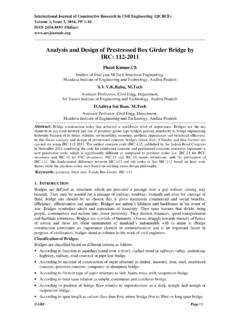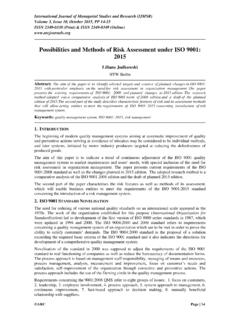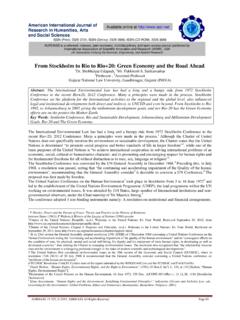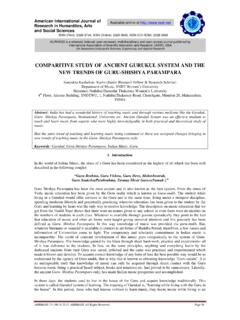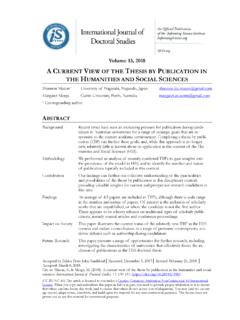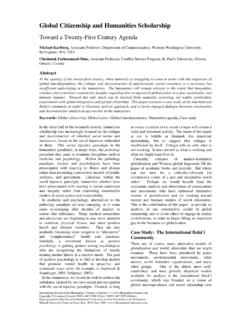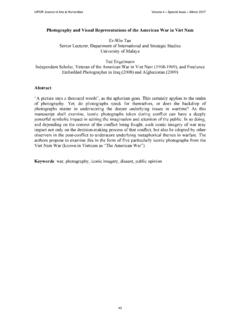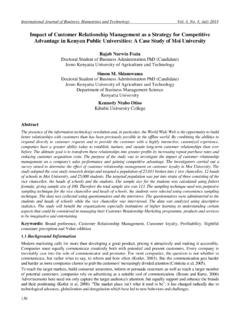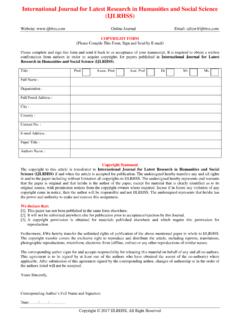Transcription of Change Management and its Effects on Organizational ...
1 international journal of humanities Social Sciences and Education (IJHSSE) Volume 1, Issue 11, November 2014, PP 170-179 ISSN 2349-0373 (Print) & ISSN 2349-0381 (Online) ARC Page 170 Change Management and its Effects on Organizational Performance of Nigerian Telecoms Industries: Empirical Insight from Airtel Nigeria Dr. Olajide Olubayo Thomas Department of Business Administration Faculty of Management Sciences, Lagos State University, Nigeria Abstract: The rate of competition in the telecommunication industry in Nigeria is moving at a leap frog basis due to changes in technology, product and services, customer taste among others. This has made Change Management experts to emphasize on the importance of establishing organizations readiness for Change and have crafted various strategies for creating it because successful Management of Change is crucial to any organization to survive in the present highly competitive and continuously evolving business environment.
2 Change Management is a planned loom for the transition of individuals, groups and organizations from existing state to a required future state. Thus, managing a Change process is as important as Change itself. This study therefore examine empirically Change Management and its Effects on Organizational performance of Nigerian telecoms industries. In conducting this study, a total of 300 staffs of Airtel were randomly selected from a staff population of 1000. Three hypotheses were advanced to guide the study and data collected for the study were analyzed using One-way Analysis of Variance. The result revealed that changes in technology has a significant effect on performance and that changes in customer taste has a significant effect on customer s patronage. The result also shows that changes in Management via leadership has a significant effect onemployee s performance. Based on the findings of the study, recommendation were made that telecoms industries in Nigeria should be pro-active to changes in such a competitive environment so as to experience smooth implementation of such changes.
3 The study therefore concludes that nothing remain still in the world of business as Change is the only thing that is constant. Change managers should therefore successfully manage the human side of Change in order to avoid resistance to Change using the appropriate Change strategies, thus, enhancing overall performance of the industry. Keywords: Change managements, Effects , changes in technology, customers taste, Change implementation and performance. 1. INTRODUCTION The telecommunication industry is an integral segment of the information technology sector that is sensitive to external environmental changes. In order to remain competitive, telecoms must be flexible to quickly react and adapt to external environment challenges. Due to the close interaction and relationship between employees and managers, there can be direct Effects on a telecommunication performance when internal and external changes occur.
4 Go and Pine (2005), stated that rapid and unpredictable changes in customer attitudes and information technology makes the need to manage changes inevitable and that the ability to manage is the key to the long- term survival of telecommunication companies. Mullins (2009) also claim that factors such as uncertain economic and political conditions, changes in social attitudes, fierce competition, take overs, acquisitions, technological developments and governmental interventions create an increasingly volatile environment for telecommunication industry and consequently they can only perform effectively through flexibility and responsiveness to Change . In today s business environment, nothing remains still. The rate of Change which business organizations face continues to increase more and more in the last five decades.
5 This is as a result of advances in information and communication technology increasing democratization of economies and liberalization of economies across the globe. Change thus now become inevitable and turns to be a regular feature of business life. This necessitate the fact that it cannot Dr. Olajide Olubayo Thomas international journal of humanities Social Sciences and Education (IJHSSE) Page 171 be wished away but to give it the necessary attention (inform of Management ) in order to guarantee continual increased business performance. John .f. Kennedy (2005) suggests that those that fail to accept and embrace Change will have a limited future. In his words Change is the law of life and those who look only to the past or present are certain to miss the future. Business environment across the globe has become increasingly volatile and constantly changing in the last few decades.
6 The telecom industry has been the hardest hit of all because it is central to the globalization process that is on course. The competition in the telecommunication industry is tense. Managers in this industry today do not stimulate Change but encourage adaptation and innovation in order to improve products and services, to meet new pressures and demands. The Nigerian telecom industry was for almost five decades after independence being run as a public enterprise and the industry continues to remain non- performing and most cases epileptic in functioning, however, at the coming of another democratic dispensation in 1999{after several years of military rule in the country}, the industry became one of the areas that the then leader (olusegunobasanjo and its party) focused attention unto in order to deregulate it. The deregulation of the industry brought into place the private participation and many telecommunication firms came on board.
7 The major ones that came on board are Itatel, Mtn, Globacom, Multilinks, Econet now Airtel and a host of others. However today, many of these companies have gone under the drain, while others like Visafone is coming on board and Econet now Airtel has had course to Change their Management and identity almost four times, this is not unconnected with increasing volatility of the business environment which necessitates Change Management . In Nigeria today, the major participants in the industry are Mtn, Airtel, Globacom, and lately Etisalat and Visafone. The last two are less than five years old in the country. Going by the increasing volatility of the business environment, Change Management has become inevitable. This is to address any or all of these issues poor performance, adapting to changes arising from the external environmental pressures, achieve or maintain a competitive advantage (in terms of better price and high quality), explicit innovation.
8 Fundamentally, Organizational Change emanates from two major sources. The external source and internal sources. The external sources could be as a result of improved technology, pressure from interest groups from outside the organization such as government or competitors in the industry. The internal source of Change could be from individual such as shareholders, Management , employees. Irrespective of the source, wherever Change is obvious, the Management is always faced with the question of how to respond to this Change ? Do we Change the objectives and strategies of the organization, is it the technology we Change or human resource or organization structure or the business environment. Statement of Research Problem The telecommunication is an integral segment of the service sector. It is very fundamental to serious economic development of any nation but it is highly technologically involving, as such for firms involve in this industry to remain competitive, it must be flexible to quickly react and adapt to external environmental changes especially those that relate to technological changes.
9 The Nigerian telecommunication industry is fast growing in the country and this is continuously necessitating dynamic changes in Organizational activities relating structuring customer handling and product portfolio. The managers of these firms in this industry are continually on each other s toes trying to outwit others by devising new strategies which charges and at the same time minimized the cost of Change implementation. Going by the number of participating firms in the industry as at year 2001 when the sector was deregulated and the few existing ones by now, one could not but be baffled. The conclusion one can easily draw is that many of these firms that have gone under not effectively managed the Change that occured in the industry which eventually swept them off. The poor survival rate indicates a fundamental lack of a valid frame work of how to implement and manage Organizational Change .
10 This indicates that there is much to Change Management that needs to be learnt. It is on the basis of unassuming changes in the telecommunication industry that this study is carried out to unveil the hidden facts of how technological Change is affecting this industry. When Change is not properly managed, there is the tendency it affects performance negatively which may result in total closure of the organization as it happens to many of the firms in the industry, or loss of valued employees or failure to meet Change Management and its Effects on Organizational Performance of Nigerian Telecoms Industries: Empirical Insight from Airtel Nigeria international journal of humanities Social Sciences and Education (IJHSSE) Page 172 financial objectives of shareholders and may eventually degenerate into customers dissatisfaction who could easily move to other competitors thereby affecting the overall performance of the firm.
